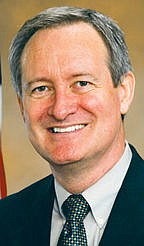Tax audit directive raises more questions than answers
President Biden has hit the campaign trail touting the so-called victories of “Bidenomics.” However, for most Idahoans, Bidenomics has meant record-high grocery bills, soaring housing costs, a $33 trillion national debt and a higher tax burden.
Despite these negative economic conditions, the Administration is steadfast in its campaign to convince low- and middle-income taxpayers that this economy is working for them. But, the facts do not support the spin. Take, for example, Treasury Secretary Janet Yellen’s directive that tax audits will not increase on households making under $400,000 annually. Beneath the comforting simplicity of this directive lurk questionable details raising concerns as to how it may affect Idahoans and all American taxpayers.
This includes, what does “making under $400,000” truly mean? When my Republican colleagues and I asked IRS Commissioner Danny Werfel, he responded that audit rates would be tentatively benchmarked to audits for 2018 tax filings and the income threshold would be $400,000 of “total positive income” (TPI). Unfortunately, Commissioner Werfel’s answers create more questions. To most Americans, what they “make” means what they take home after paying expenses and incurring losses. But, TPI is defined by the IRS as “the sum of all positive amounts shown for the various sources of income reported on the individual tax return, and losses are treated as $0.”
This could impact many taxpayers who in reality make far less than $400,000. How would this affect an Idaho small business owner whose gross sales generate more than $400,000, but after expenses and losses, takes home much less? TPI appears to be an extremely broad measure that will catch many unsuspecting taxpayers in the IRS’s audit dragnet. This is not the only tax trap set by the directive. The directive also appears to include a marriage penalty, as the $400,000 threshold applies to a single individual, while couples must share it.
A closer examination of what freezing audits at the 2018 level means for taxpayers reveals more reason for concern.
IRS statistics show 485,074 individual returns reporting less than $200,000 had their 2018 tax returns audited. Does this mean that moving forward, we should expect nearly half a million hard working Americans making less than $200,000 to undergo audits annually, while IRS’s customer service remains deficient?
Because the directive is unenforceable and has no accountability mechanism, how will taxpayers know if the IRS breaks its promise by auditing more under the $400,000 threshold than it did in 2018, and how will the Administration compensate those who should not have been audited?
The directive’s 2018 audit standard could be short-lived. When asked how long 2018 audit levels would last, Commissioner Werfel said, “We’ll revisit that in a few years and see where we are.” This tracks with what the nonpartisan Congressional Budget Office has said, which is that in a few years a significant number of newly-trained IRS auditors will be ready to examine taxpayers.
The Administration’s $400,000 directive is not designed to just narrowly target “millionaires and billionaires.” Rather, the directive’s ambiguous wording would enable the IRS to target the largest part of the tax gap (the difference between taxes owed and taxes paid), underreporting by those making less than $400,000 a year.
I introduced legislation that would make the directive meaningful by replacing the ambiguous income standard and vague timeframe with a clear, taxable income standard effective during the ten years the IRS will spend its super-sized enforcement budget. Putting the Administration’s directive into law, in contrast to nonbinding statements of intention or unenforceable, vague Treasury Department edicts, will truly protect low- and middle-income taxpayers from the coming wave of IRS examinations.
Mike Crapo represents Idaho’s First Congressional District in the U.S. Senate. He can be reached at crapo.senate.gov.

